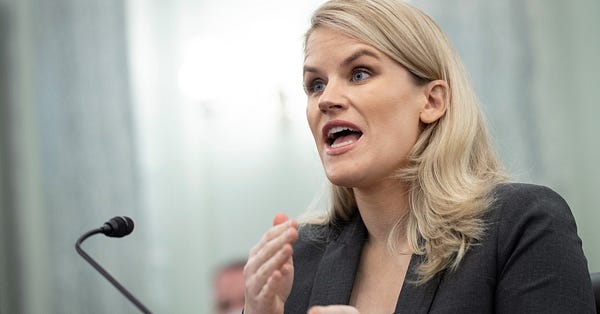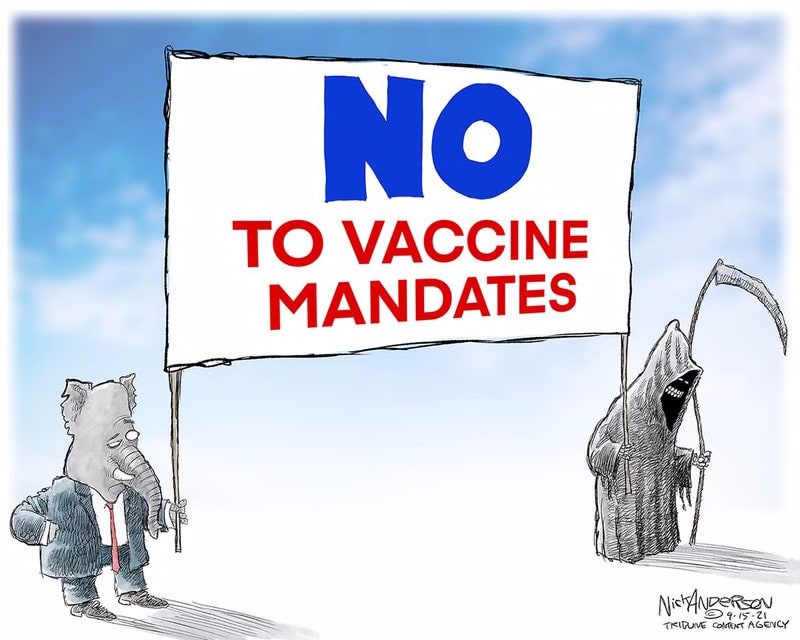When rejecting public health becomes a political identity
Vaccines work, Covid19 is real, and further tragedy is utterly avoidable
Sree’s newsletter is produced w/ Zach Peterson (@zachprague). Cartoon by Pulitzer Prize-winner Nick Anderson (@Nick_Anderson_), the new managing editor of ReformAustin.org.
Scroll down for Read Something; Watch Something; and a weekly tech tip from Robert S. Anthony (@newyorkbob).
TUNE IN: Our #NYTReadalong this week was w/ Broadway stalwarts Nancy Ringham Smith and Chris Smith (recording). Recent episodes: Jarrett Adams, a lawyer who was falsely convicted at 17 and exonerated a decade later; Jeanne Pinder, creator of Clear Health Costs. The NYTReadalong is sponsored by Muck Rack.
My Digimentors team is working with companies and nonprofits around the world to create virtual and hybrid events. We’ve worked on events for 50 people and 100,000. See our updated brochure. Don’t cancel or postpone your conference - contact us! sree@sree.net
***
There’s so much to say about the anti-vaxx movement in America - none of it any good. Anti-vaxxers are a major reason the pandemic continues to kill people in this country.
As of October 8, 65.7% of the U.S population have received at least one dose of the Covid19 vaccine and 56.7% of Americans are fully vaccinated. That means more 50 million people eligible for a free, safe, effective vaccine are saying “no thanks.”
So much of it comes down to information hygiene and news literacy, but there is also a level of sophistication here that I think some people miss.


It’s easy to have your eyes glaze over when hearing how disinformation and conspiracy theories spread on social media and attract people who simply do not know any better — but this video and others like it are a different story. The mix of well-produced material and relatively charismatic personalities with devoted followings has proven to be fatal for the U.S.
The amount of time, energy and editing skills that anti-vaxxers and anti-maskers put into spreading their lies could be used in so many productive ways. But they just can't help themselves.
The thing is, a life-saving vaccine that is truly a miracle of modern science (which should be open-sourced and shared with the world), became a political issue that will certainly define the midterms next year, and will likely be the cornerstone issue of the next presidential race. This episode of the 538 Politics podcast is really worth a listen. Scott Gottlieb ran the FDA from 2017-2019, and his view from the inside is worth listening to.


There is an especially interesting bit roughly halfway through the episode where they discuss the cost/benefit of really trying to convert the inconvertible to get the shot. Gottlieb isn’t so sure that it’s worth it, and he makes a pretty compelling case. Leaving that specific argument aside, it still shocking to me that this has become the political issue that it has.
Here’s a data point from the California recall election that hammers it home:
Local government and school board meetings are being disrupted by anti-mask and anti-vaxx people, right-wing media is consistently pouring fuel on the fire, and more than a third of the country has clearly settled on its position.
It’s a political position that can literally kill, and yet, here we are.
I don’t think there is much to do about the people at the far reaches of the movement, but I do think it’s worth making every effort to get as many people as possible to at least acknowledge that 1.) Covid19 is real and deadly; 2.) Masks reduce virus transmission; and, 3.) The vaccines clearly work.
The rejection of very basic tenets of public medicine has somehow become a political identity, and it’s important that we do all we can to stem it. That may mean a lot of dead-end conversations, but one more person simply acknowledging the severity of the last two years sounds like a good thing to me.
- Sree
This week, we are delighted to announce a year-long partnership with our friends at Armory Square Ventures, a VC firm I’ve gotten to know in recent years. Managing Partner Somak Chattopadhyay (@somakc), Partner Pia Sawhney (@pia_sawhney) and their team are funding startups in places overlooked by other funders. They are a new sponsor of the newsletter and we will be bringing you their messaging in every issue. Read more about them below (they’re hiring!).
Creativity Can Come from Anywhere
It's why we invest.
Based in the Finger Lakes and New York City, Armory Square Ventures is a seed and early-stage technology VC that funds software startups in places overlooked by other venture firms. We serve as a community catalyst and an optimism engine for emerging entrepreneurial ecosystems outside Silicon Valley. Presently, we are actively recruiting for opportunities across our portfolio.
Take a look at www.armorysv.com to learn more.
Sponsored by Armory Square Ventures
Read Something
The last two editions of this newsletter (here and here) have been Facebook-centric. This piece by Karen Hao really gets at the most important part of the core issue - the algorithm, how it works, and the revenue it generates.


Down and Out: Where Do You Go When Social Media Disappears?
By Robert S. Anthony
Each week, veteran tech journalist Bob Anthony shares a tech tip you don’t want to miss. Follow him @newyorkbob.
When Facebook, Instagram and WhatsApp went offline for a few hours Oct. 4, it seemed like people fell into two camps: Those who pulled their hair out and used language that can’t be used here and those who didn’t care—or didn’t notice.
While the inability to scroll through vacation photos, memes, funny selfies and office gossip for a few hours hardly rises to the level of a national emergency, the sudden disappearance of these platforms jarred many users out of their routines, leaving some momentarily stunned and stressed.
So, what caused the outage? According to Santosh Janardhan, vice president for infrastructure at Facebook (which owns Instagram and WhatsApp), “a faulty configuration change on our end” disrupted network traffic between Facebook’s numerous global data centers.
When the data centers went offline, the servers that allow other computers to locate Facebook went down as well, he said, noting that Facebook’s own security defenses against unauthorized access made it harder to make the modifications needed to turn things back on quickly.
The worst part of the outage for users seemed to be the feeling of being unprepared—like not having flashlight batteries when the power goes out. So how does one prepare for a social media outage? Be flexible. Calm down and use other communications methods.
That camera-laden, GPS-enabled, Internet-capable, step-counting smartphone in your pocket actually makes phone calls—use that feature. If you replace instant messaging from your computer with texts from your smartphone, remember to switch to Wi-Fi before sending out lots of photos or videos—otherwise, you might blow out your phone’s data plan.
Remember that not everything requires instant messaging. Slow down and write an email—you can still add photos and videos and you won’t get bitten by the autocorrect bug as often.
Stressing about things you can’t control like data center failures isn’t healthy. All the major social media platforms have redundant data storage methods. While they may go offline like they did Oct. 4, your data is stored in multiple locations and pretty safe from disappearing altogether.
In some ways the outage was refreshing, reminding us that there are real worlds beyond the screens we stare at all day. Some of us rediscovered ancient methods of communications like listening to the radio and knocking on doors and (*gasp*) talking to people face to face.
If the Facebook outage caused you to take a walk, pick up a book or newspaper, play with the cat or start a conversation with someone you may have ignored if these social media platforms had been working, then maybe it was a good day.
Watch Something
Need a hand talking about vaccines? @DrMike and UNICEF is here to help. It may seem corny, but things like this are important public services that help normal people explain complicated things to other normal people.
Odds & Ends
🗞 TUNE IN: Our #NYTReadalong this week was w/ Broadway stalwarts Nancy Ringham Smith and Chris Smith (recording). Recent episodes: Jarrett Adams, a lawyer who was falsely convicted at 17 and exonerated a decade later; Jeanne Pinder, creator of Clear Health Costs. The NYTReadalong is sponsored by Muck Rack.
The NYTReadalong is sponsored by Muck Rack. Interested in sponsorship opportunities? Email sree@digimentors.group and neil@digimentors.group.
The Readalong is followed, on most Sundays at 11 am-noon ET, by a medical show I’m co-executive producing with surgeons Sujana Chandrasekhar, M.D. (@DrSujanaENT), and Marina Kurian, M.D. (@MarinaKurian), called She’s On Call (watch live or later). Here’s the Apple Podcasts version.
After 250 episodes in 250 days, my global show has moved to a weekly cadence. The best way to know when I’m on the air and see all my archived shows is to subscribe to my YouTube channel or my Whatsapp alerts.
👀 Did we miss anything? Make a mistake? Do you have an idea for anything we’re up to? Let us know! Let’s collaborate! If you like this newsletter, you can “heart it” and/or share it on social media or forward it to a friend. | sree@sree.net | Twitter | Instagram | LinkedIn







I'm curious whether, if we are actually able to see a decline in cases this winter, Republicans will claim credit for eradicating the virus by not having vaccines.